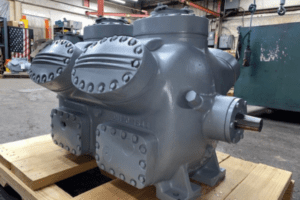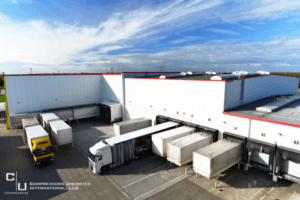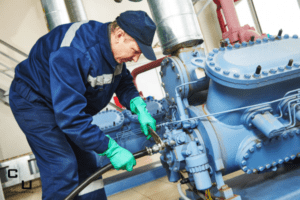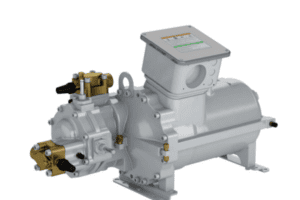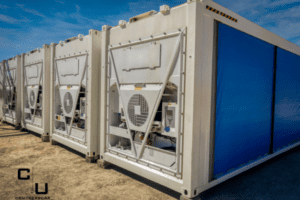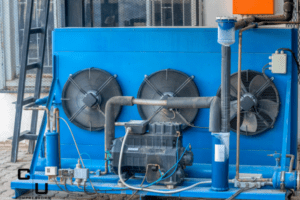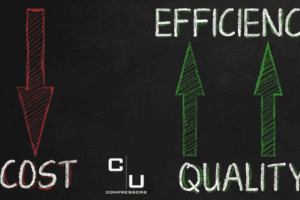

Not so in the world of commercial HVAC systems. The basics remain the same – the compressor moves refrigerant gas through the system and air is heated or cooled depending on which components it goes to next – but there are many more considerations to bear in mind.
If you are in the position of selecting a commercial HVAC system for new commercial construction, you have a variety of options.
Business leaders planning a new HVAC must balance three main concerns:
- Overall cost of system ownership, including energy efficiency and maintenance
- Temperature levels required by staff and the public based on the local climate
- Specialized requirements, such as server rooms that must be extremely cold
Any type of HVAC system you choose will have some performance trade-offs in one or more areas. If you select the right system and size compressor units correctly, however, you’ll avoid situations where your HVAC works too hard to achieve your desired temperature.
The Three Main Kinds of Commercial HVAC Systems
A commercial HVAC system is sure to be larger and more complex than a residential system. Luckily, that doesn’t mean there’s an infinite number of combinations to work through. In fact, only three varieties of commercial HVACs are in wide use. All the configurations you encounter are variations of these.
They are:
Single Split HVAC System
These systems are usually chosen for smaller commercial buildings. They have the potential to be highly efficient and deliver results with a relatively modest upfront investment. They typically include both an air conditioning unit and a furnace, as well as an evaporator coil to facilitate circulation.
Advantages
- Far less expensive to install and fewer points of fault than a centralized system
- Each unit is fully self-contained, so failures in one area do not affect the others
- Compatible with a wide variety of standard thermostats or panels
- Useful in small to mid-sized office buildings, shopping centers, and restaurants
Multi Split HVAC System
A multi split system can be even more efficient than a single split system because it does not require each indoor unit to be paired with a corresponding outdoor unit. You can connect up to nine indoor units to a single outdoor unit without affecting performance.
Advantages
- Advanced sensor systems save money by making most compressor cycling unnecessary
- Includes heat pumps that effectively move heat from warm areas to cool ones as needed
- Aesthetics can be improved substantially over single split systems as fewer units are used
- Great for mid-sized structures and harsh winter conditions where heat must be used efficiently
Variable Refrigerant Flow (VRF) HVAC System
VRF systems come in heat pump or heat recovery varieties.
A heat pump VRF system can provide heating or cooling to a structure, but cannot perform both of these functions at the same time. It can be a wise choice for commercial buildings with open floor plans, such as many modern offices where teams congregate in a large, centralized space.
A heat recovery VRF system is the most advanced selection for commercial applications. It can heat and cool different areas of a building at the same time. That makes it suitable for scenarios where you need to provide heating or cooling for an assortment of small rooms or individual offices.
Advantages
- VRF systems are reliable and efficient, upholding strong performance with regular maintenance
- Ease of operation means you do not need HVAC system expertise for day-to-day adjustments
- Fast installation allows business owners to update their systems without any major disruption
- Operating qualities make VRF ideal in situations where other options would suffer inefficiency
Selecting the Right Commercial HVAC System for Your Business
As you can see, the size and layout of your space are principal considerations no matter what kind of business you have. Aside from verifying the dimensions of your building, you should also sit down with a floor plan to determine how many unique temperature zones you need.
Some systems are much more versatile in creating individual temperature zones, while others are most useful for large spaces with homogenous indoor climate. It is helpful to consult with a commercial HVAC team so you can double-check your assumptions before you go forward.
Remember that, no matter your system’s configuration, a commercial HVAC will likely require several compressors. The compressor does the majority of mechanical work in the system, compressing the refrigerant gas so it reaches the appropriate pressure levels.
Compressor replacement is a significant cost in the long run of any system. Remanufactured commercial compressors give you the opportunity to get performance comparable to an all-new unit at a fraction of the price and weeks sooner than an OEM wholesaler. That can be the key to standing up your new system at the lowest cost.


